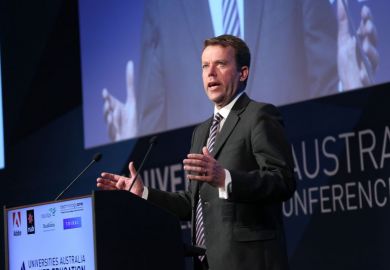Raising tuition fees in Australia is the only realistic way to stop thousands of school-leavers losing their shot at higher education, according to Australian National University policy expert Andrew Norton.
In a report for the Higher Education Policy Institute, published on 19 March, Professor Norton warns that current funding settings will not be able to accommodate an emerging “baby boom generation”, with the number of school-leavers set to skyrocket over the next five years.
While “the politics of increased student charges are never easy”, his report says, “compromise is needed to share the cost of expansion”.
Education minister Dan Tehan last month signalled that fee hikes were on the government’s agenda. Professor Norton says that the financial returns from degrees are declining, and increased fees would seem an “added injustice” to students of the 2020s.
“But this is a lesser injustice than reduced higher education opportunities,” he insists, arguing that a squeeze in university places would disproportionately affect the disadvantaged.
He says the sector must avoid a repeat of the 2017 “impasse” when the government capped university places after its attempts to rein in higher education costs – by increasing fees, among other measures – were blocked by the senate.
Professor Norton says that those measures failed partly because Australians could not see the need for them. By contrast, all major higher education players now recognise that “the looming loss of higher education opportunities” must be avoided. “The issue could be easily explained to the general public, which will support the policy goal even if they have doubts over the means,” he writes.
The government, for its part, would need to end the decline in real higher education funding by ensuring that teaching grants keep pace with enrolments and inflation. “Significant demographic changes have unavoidable consequences for government,” the report warns. “It would be politically difficult, if not impossible, for the government to ask others…to contribute more while it continues to contribute less.”
Professor Norton says lobby groups that could not bring themselves to support a fee increase must “at least mute their campaigning against it”. Unlike in 2017, he says, universities understand the alternatives.
“Under the status quo, they face real annual cuts in per student funding unless they reduce student places, which many would see as undermining their missions. Some funded growth in student places is a better option,” Professor Norton says.
He says that while opposition MPs would inevitably greet a fee increase proposal with “the usual complaints”, opposing it in parliament would not be in their interests. “From their perspective, if some shared financial burden is needed for long-run increases in higher education student places, it is better that the Liberals pay the political price now rather than Labor when it returns to office,” he writes.
The report advocates a return to the demand-driven system as the best way of addressing the spike in demand. Hepi director Nick Hillman said that it was timely advice for the UK, which faced a potential reimposition of “student number controls” despite its own looming demographic bulge.
Professor Norton also repeats calls for universities to make students more aware of the expiry date of the “try before you buy” period, after which they incur debt. This would help “protect students who, for whatever reason, are not on track for success”.
Register to continue
Why register?
- Registration is free and only takes a moment
- Once registered, you can read 3 articles a month
- Sign up for our newsletter
Subscribe
Or subscribe for unlimited access to:
- Unlimited access to news, views, insights & reviews
- Digital editions
- Digital access to THE’s university and college rankings analysis
Already registered or a current subscriber?










